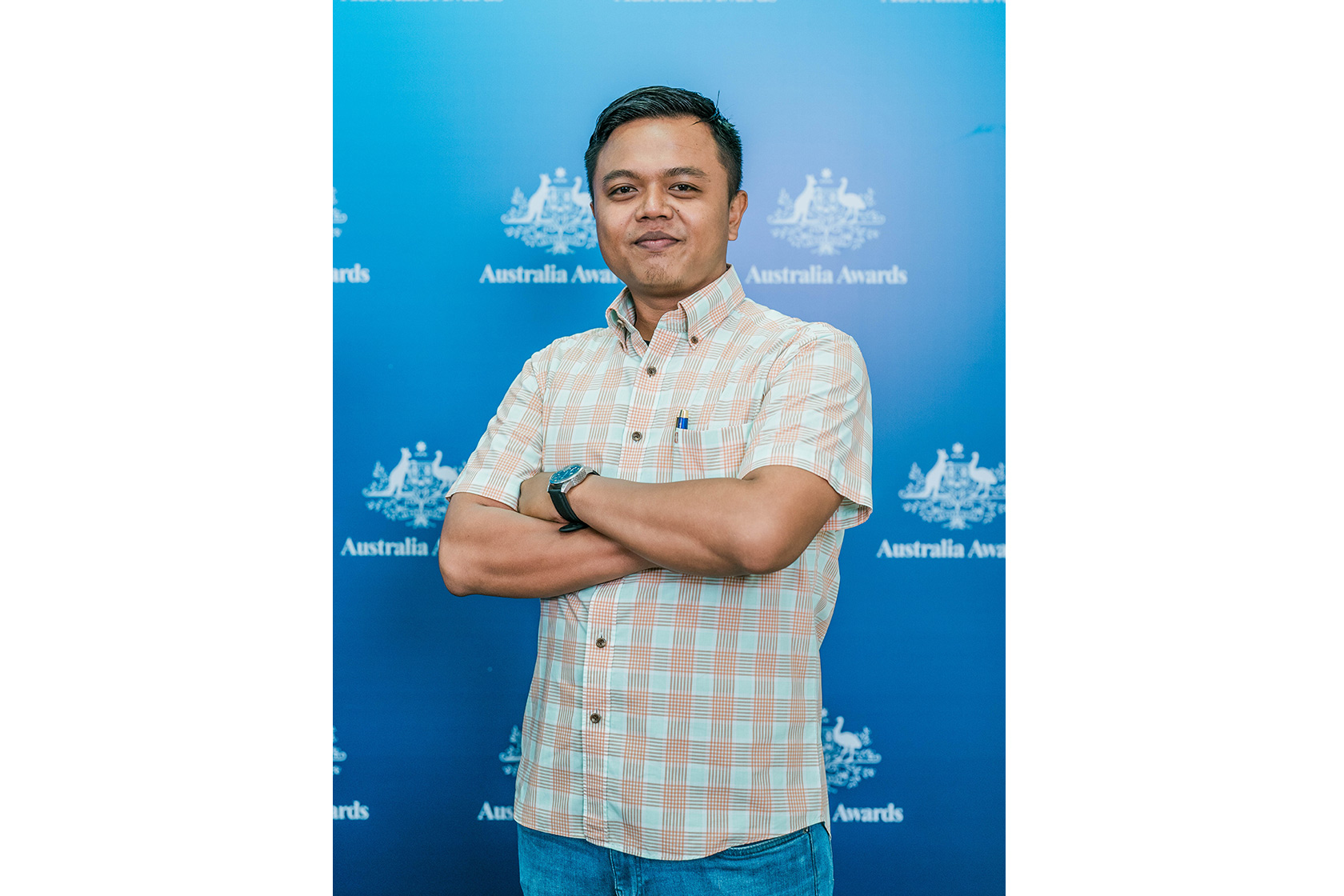
06 November 2025
Ikuti Sesi Informasi Beasiswa untuk Calon Pelamar dari Gorontalo 2025
Are you considering taking your academic journey to the next level in Australia through an Australia... Baca selengkapnya
Australia Awards adalah beasiswa dan studi singkat bergengsi yang bersifat transformatif, diberikan kepada para pemimpin masa depan untuk menempuh studi, penelitian, dan pengembangan profesional di Australia

23 September 2025
 Givano Ramadhan: Memperjuangkan Masa Depan Pariwisata Berbasis Data
Givano Ramadhan: Memperjuangkan Masa Depan Pariwisata Berbasis Data
Enrolling in a one-of-a-kind scholarship program has given Australia Awards scholar Givano Ramadhan new perspectives on how data can contribute to a sustainable future for tourism.
As Tourism Analyst at the Langkat Regency Tourism Office in North Sumatra since 2019, he is responsible for developing annual and strategic plans, procuring goods and services, and promoting local tourism destinations.
‘During planning and results evaluation, I accompany my colleagues in the field,’ Givano explained. I observe conditions on the ground and the efforts made to achieve set targets. My role is to help interpret and clarify their intended actions, align them with the goals established by the president and the province, and document the process.
The office covers 52 natural tourism destinations, eight cultural heritage sites and nine tourism places in 23 subdistricts. Before joining the tourism office, Givano worked in hospitality for several years after graduating from Universitas Gajah Mada with a bachelor’s degree in tourism and travel services management.
He acknowledged that tourism became more exciting,as well as challengingin 2016, when then President Joko Widodo announced the acceleration of tourism development in priority destinations under the ‘10 New Balis’ initiative.
‘That particular moment made me determined to pursue this field, along with my time in the tourism office and seeing the conditions on the ground of how tourism plays a part in distributing wealth,’ Givano said.
Mastering Tourism Skills in Australia
In 2023, Givano received an Australia Awards Scholarship for the Split-Site Masters Program (SSMP) to undertake a Masters in Tourism Planning at the Institut Teknologi Bandung (ITB) and a Masters of International Sustainable Tourism Management at Monash University. He is currently in Australia after completing his studies.
‘I decided to delve into the field further because I wanted to change the fate of many people through tourism. It's been proven that many people prosper in this field, even if indirectly through the multiplier effect. Being able to change people's lives feels rewarding to me,’ Givano said.
He was drawn to the SSMP as it allows recipients to study at 2 respected universities, pursuing a subject relevant to their educational and career background.
Givano acknowledged three lecturers in particular who convinced him to choose ITB and Monash University. They were Alhilal Furqan, who’s known for developing community-based tourism concepts; Dr Jeff Jarvis, an expert on independent travellers and backpacker tourism; and Peter Clay, partner of Dr Jarvis and a PhD candidate with extraordinary skills in data.
‘Peter Clay opened my eyes to the fact that data means nothing unless we can interpret it and compile it as something that the public can comprehend. These three lecturers made me certain in my decision to pursue the SSMP because I felt this was a perfect fit for the destinations in Langkat, which are still in the development stage,’ said Givano.
He highly recommended the SSMP to anyone who wished to further their education.
‘I’ve been able to experience 2 top universities with diverse environments, in terms of educational systems, lecturers and languages,’ he said. ‘Studying intwo different environments absolutely broadens your horizons and experiences. The studies are complementary and allow for wiser decision-making.’
Seeing the Downside of Rapid Tourism Growth
According to research from the World Travel & Tourism Council, the travel and tourism sector’s contribution to the Indonesian economy is expected to reach an all-time high this year of AUD 116.2 billion, representing 5.5% of the country’s GDP.
However, Givano acknowledged that he had seen the downside of tourism in his line of work. He shared that when the 10 New Balis initiative was announced and mandated by the former president, he saw how almost everyone in the tourism sector raced to fulfil the vision.
Competition became fierce, and investment went wild, he said. A tourist attraction might be popular for 6 months, but afterwards it slowly collapses.
‘Many tourist villages were created, but I don't know if they truly understood the assignment,’ said Givano.
‘They were simply designated to reach targets set by the ministry, trying to be part of a larger trend. As a result, many low-quality tourist attractions sprang up. They were not based on reliable data and adequate calculations.’
Planning a Strategic and Connected Tourism Network
According to Givano, an evidence-based, collaborative approach to tourism planning will ensure sustainable, positive impacts.
‘I saw that the most critical thing was the lack of collaboration within the government itself,’ he said.
‘Each had its own priorities in achieving target indicators, but since the goal of tourism was to improve the economy and public welfare, our metrics were solely monetary, instead of community or visitor satisfaction.
‘So, the most important thing that needs to be addressed right now is our ability to make data-driven decisions. We need to be able to interpret data, by collaborating with research universities, so that the results and the decisions made by stakeholders will truly impact society. This is not easy, but it's not impossible either.’
Givano reiterated how his study in Australia would contribute to this work in future.
'Along with fulfilling the requirement to be the agency’s head by pursuing a master’s degree, my time in Australia has advanced my ability in data analysis, and I have a better comprehension of data. This is actually very influential going forward and hopefully this will improve my ability to set targets and develop plans,’ he said.
Sharing the Benefits of Tourism in Communities
Givano’s ambition is not to make change happen overnight. He aspires to make a difference with his focus on the tourism sector planning.
‘My ultimate satisfaction lies when my plans truly impact communities,’ he said, adding that the impact of this may not be felt for another 5 to 10 years.
While some destinations in Indonesia continued to boom, Givano said there were lesser-known regions still lacking the marketing and recognition they deserve. He also encouraged reducing transportation costs to make travel feasible for more people.
‘Doing so seems very difficult, due to the significant costs and various layers of taxes. But various parties have to collaborate to move forward together,’ Givano said. ‘Stakeholders, especially local governments, should understand the conditions on the ground better so that decisions are made based on data.’







Bagikan berita ini di:
 Berita Terkait
Berita TerkaitSitus web ini menggunakan cookie untuk meningkatkan pengalaman Anda menggunakan situs web. Kami juga dapat menggunakan cookie untuk menganalisis data situs web sehingga kami dapat meningkatkan layanan online kami. Untuk mengetahui lebih lanjut, kunjungi kebijakan privasi.
